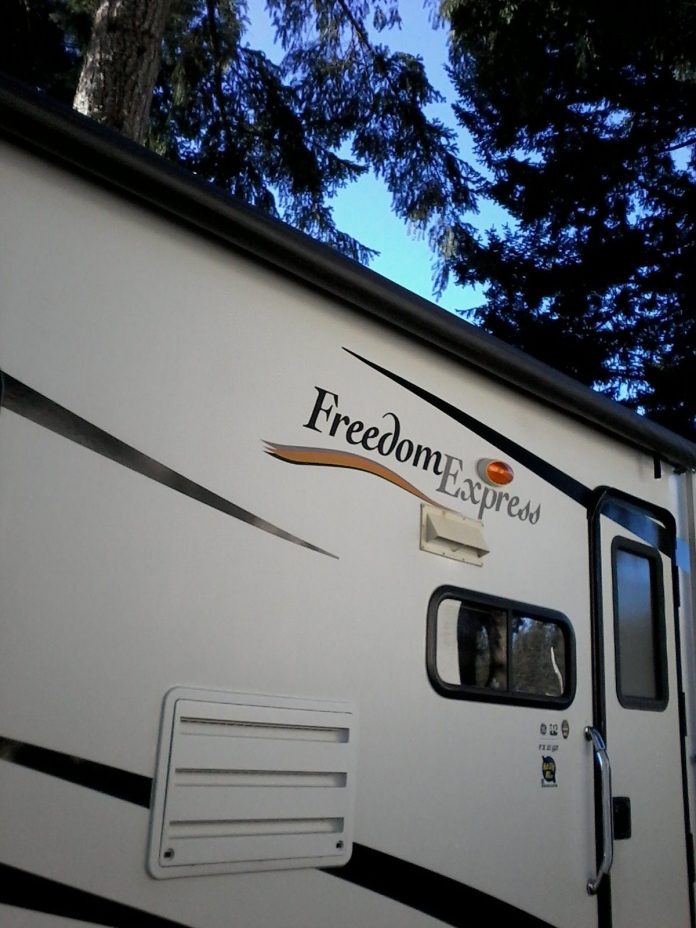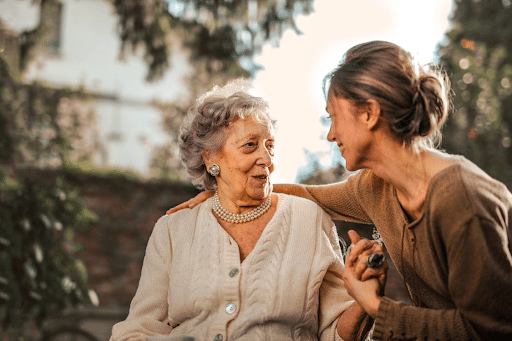I’d been planning it for years. I wouldn’t retire but would downsize and move to a quiet small town close to nature. In British Columbia however, even quiet small towns don’t have cheap houses for sale, not for those who have spent life “living for the moment” rather than saving for the future. I hit on a solution though, something cheaper than a house or condo: I bought a motorhome. It’s an apartment on wheels, simple and spare for a time of life when one wants to burn away the excess and keep what really matters. That’s when the downsizing plan got real. Furniture, clothes, books, ornaments, gifts kept for sentimental reasons had now to be unsentimentally culled.
What still “really matters” is heat and light, but unfortunately I found those elusive in my first month of motor-home living. First, I bought the vehicle and had it driven to my site (not yet brave enough to drive the thing myself). It is cozy — meaning small. I head to the small town which was my destination by driving behind my new house on wheels, in a mini-van full of objects which remain in the van to this day because there’s no room for them in the motor-inn. Couch, table, bed and such are fitted into motorhomes. Walls are covered by cupboards, windows and signs saying “warning” and “danger” about hazards to do with propane, carbon monoxide and fire (hazards which I hadn’t even considered when I first had my motorhome idea). No room for pictures on the walls then. More downsizing.
MH living would be a new adventure, that was for sure. The problem is that one almost needs a PhD in handyman skills once the delivery men drive off and leave you “hooked up”. Strange lights blinked in strange places: under the fridge, beside the kitchen sink, at the end of the bed. “That’s your command centre” said the MH vendor, vaguely waving his hand before vanishing. Command centre? Is this a space ship? What if I don’t understand the signals, and am not in command?
I soon found that the toilet and electric outlets didn’t work and the propane tank was almost empty (what was propane again?). I call the vendor. The firm says someone will come and sort it out. Someone does, fiddles with knobs, says “there you go” and disappears, after which I find that the plumbing and electricity are still not functioning. He comes back and this time brings a new toilet. Later he comes again and improves something electrical, adding outlets. All this takes time, and coaxing, and complaining … but nevertheless I’m getting to like the feel of my little nest.
During heatless days after the propane ran out I find the first place I always go to in a new town: the public library. Thank heaven for libraries. Warmth and books can see you through a lot. The next thing I ferret out is the hardware store, to buy a space heater and all the bulbs, screws, mats and what-nots you need in a second-hand MH. With every mug, towel and dish I make it more my own. There are strange (to me) rituals to learn: how to empty the holding tank where the grey water goes, how to roll up the awning outside the door.
There are strange sounds too. I’m parked under tall fir trees, and fir cones fly down from a great height in a windstorm, sounding like gunshots with the force of their descent (“wait until August when the squirrels throw them down for fun,” says my neighbour). And now I know what rain “drumming” on a flat roof really means: a hundred bass drums. Then it snows … and it snows … after several days the branches sag and snow slides onto my roof in heavy clumps. I thought someone was jumping up there. Yet I don’t mind these sounds, they are the nature I’d come to live near, and I wouldn’t want to live in a world without big trees. And squirrels. At night I go out in the dark and enjoy a healing silence such as you never get in a city, total snow-hush while tiny gossamer glistening flakes float under the lights of the motorhome park.
I’m surrounded by beauty: a river behind me lined with mossy forest trees and a beach in front which stretches one day in a translucent blue from paradise, the next an angry storm-tossed grey. Some days the tide is out revealing sandbars and a smorgasbord of shells, other days a high tide piles seaweeds at the top of the beach. Gulls wheel and I discover that they can call to each other as they fly even when their mouths are holding a clam. Eagles watch from tree tops and seals bark offshore.
No matter how engaging the surroundings are I always look forward to coming home to “MH”. I enjoy the contrast between tiny nest within and vast ocean and woods outside the door. The nest holds all one needs: comfortable bed, shower, reading spot under a good light, one place to open a laptop and another to boil water for tea. Evenings I sit at my little swivel table before a picnic of treats, grazing and reading as if on an airplane and travelling to fascinating places, which I am – through books. At night I sleep as soundly as the logs on the beach. What else do you need? A reclusive type, if she wants to, can even escape entertaining (“so sorry, I’m afraid my nest on wheels is just too tiny …”).
There is society enough in the RV park, friendly people who like helping a newcomer with practical dilemmas, displaying the skill set they’ve developed with the lifestyle. Most of these neighbours are in the mature half of the life span and I soon realize that motorhome living is not my brainwave alone, but a common one among non-wealthy seniors who like living simply.
One day, like them, I might even try driving MH. I live on an island over 300 miles long – lots of room to explore, lots more nature to see. Aside from simplicity, mobility is what motorhomes offer. Theoretically the MH-er can get up and go any time, if you don’t mind driving with a box the size of an apartment behind you.
Motorhome living was an experiment for me, and one which relatives said I was mad to attempt. They were wrong. I must have been sane, because I did pare life down to what really matters and I landed on my feet — or rather, on my wheels.

























